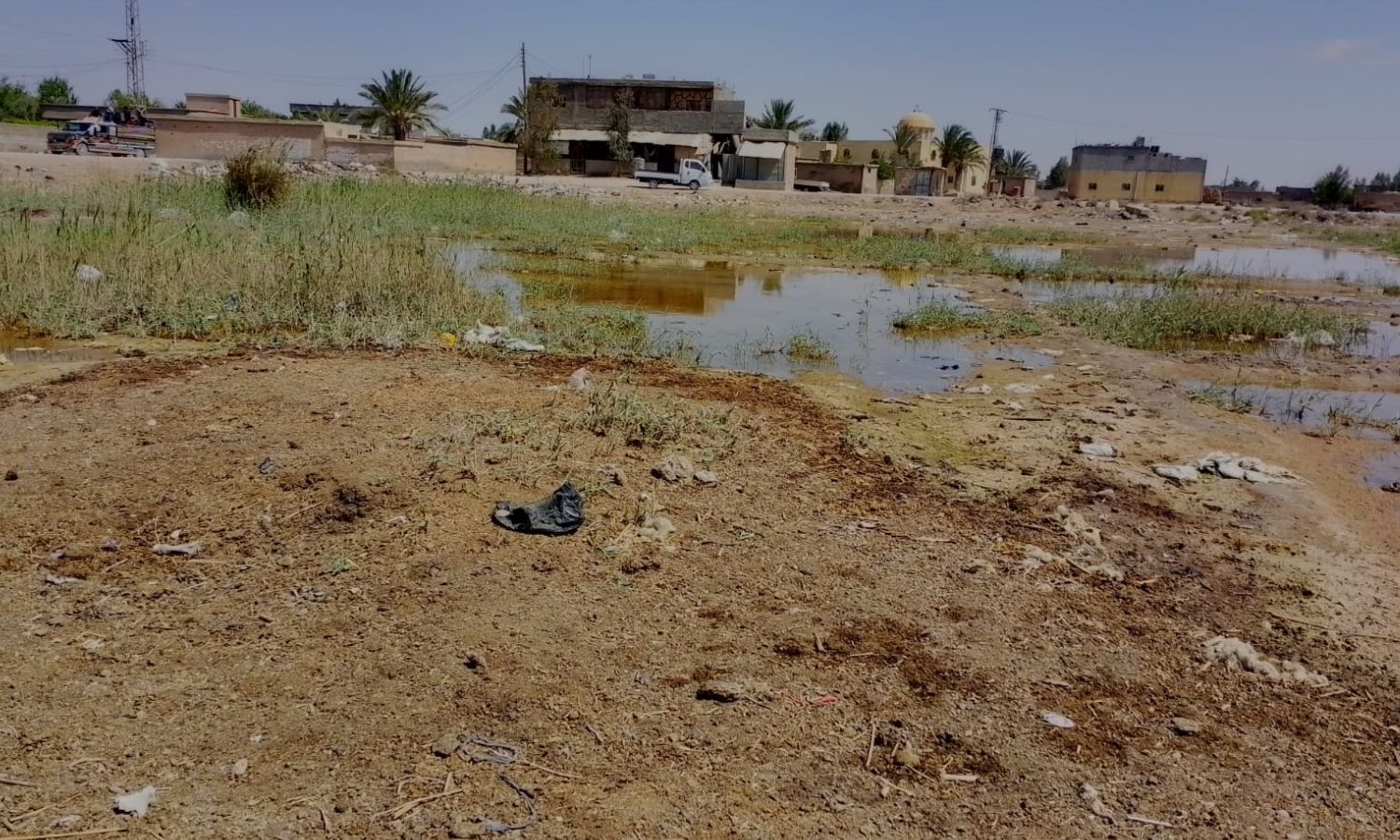



Deir Ezzor – Obadah al-Sheikh
For the past two weeks, the town of al-Shaheel in the eastern countryside of Deir Ezzor has been suffering from the spread of water ponds and their emergence on the surface of the soil, causing damage to houses and agricultural lands.
The main cause is the power outage at the pumping stations at the al-Shaheel irrigation station, which consists of 85 vertical wells, whose function is to drain excess water and return it to the course of the Euphrates River.
Residents of al-Shaheel town complain about the water that has started to appear at the foundations of their houses and inside them, which has forced some residents to leave their homes and move elsewhere.
There is no accurate statistical data from an official source about the extent of the damage, but farmers’ and residents’ estimates point to more than 200 homes and 5000 dunams being damaged in the al-Shabaka and al-Hawi al-Gharbi neighborhoods of al-Shaheel town.
Asaad al-Farhan, a farmer in the western district of al-Shaheel city, stated that the emergence of water on the surface of the soil has caused damage to his 15-dunam agricultural land, noting that this increases the salinity levels in the soil.
An employee at the Irrigation and Agriculture Committee of the Autonomous Administration of North and East Syria (AANES), who preferred not to reveal his name for security reasons, told Enab Baladi that dozens of homes were damaged following the appearance of water pools inside or around them, leading their owners to abandon them.
He mentioned that the agricultural lands where water appeared have seen their production volumes decline by more than a quarter as a result of the increased water levels reaching the plants.
Additionally, he added that the affected residents and farmers have submitted requests to rehabilitate the irrigation channel project, clear the vertical wells, and make the water flow into the Euphrates River instead of pooling in the lands and homes.
The locals tried to find an alternative solution by running submersible pumps using electric power, but the project is expensive. They consider the only solution to be restoring the electricity line to drain the groundwater and discharge it into the Euphrates River.
A worker at the irrigation station in al-Shaheel town, who reserved his name as he does not have permission to speak to the media, said to Enab Baladi that the emergence of groundwater occurred after the Energy Office cut off the electric supply to the station.
He mentioned that several proposals have been submitted to find a solution to the problem, but to no avail, noting that there are 85 vertical wells distributed along the irrigation channel that irrigates several villages and towns.
He added that the majority of the lands in al-Shaheel town today have become unsuitable for agriculture due to spread of discoloration and increased soil salinity, and the rise of groundwater to the surface of the earth.
For the agricultural rehabilitation of the region, the worker at the irrigation station said the Autonomous Administration needs to launch a land reclamation project for the affected agricultural areas, starting with reactivating the vertical drainage wells throughout the agricultural lands and repairing their drainage networks.
On April 14, the Irrigation and Agriculture Office in the Civil Council of Deir Ezzor issued a memorandum, which Enab Baladi saw a copy of, stating that irrigation in the villages of al-Raghib, Dhiban, al-Tyanah, Shanan, and Jumeh would stop after the end of the winter season, starting from June 15, in order to perform maintenance on the tiles in the Box Channel.
The office asked farmers not to plant summer crops in case there is no second irrigation source available.
Agriculture in northeast Syria, particularly in Deir Ezzor, faces several challenges, including the lack of support, rising fuel prices, and one of the most significant problems that farmers face, which is the spread of soil salinity in the eastern countryside lands of Deir Ezzor province.
Farmers attribute this to delays in cleaning and rehabilitating the excess water drains, as the accumulation of water for long periods causes soil salinity.
According to statistics conducted by the Irrigation Committee of the Autonomous Administration in the area, between 2300 and 2500 hectares have been affected by salinization, rendering their soil unsuitable for agriculture.
if you think the article contain wrong information or you have additional details Send Correction